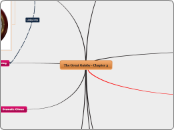The Great Gatsby - Chapter 3
Ambiguity
"Laughter is easier minute by minute"
This shows a foreshadowing of later events because at this moment in the chapter everything seems too perfect and happy in the novel and it is waiting to be ruined. We can sense a series of tragic events about to happen due to the fact that happiness and laughter seems to be too easy for them.
From this we can suspect that there will be a possible turning point in the novel and a tragic turn of events.
"Mr Gatsby would like to speak to you alone"
This suggests there is possibly some secrecy between Mr Gatsby and Miss Baker which is intriguing to reader.
This creates suspense and tells us something significant is going to happen.
foreshadowing of later events
There's a lot of conspiracy about how Gatsby became wealthy and well known.
'Somebody told me they thought he killed a man once'
'it's more that he was a German spy in the war'
All the conspiracies adds to the illusion of the people not knowing who Gatsby is by him thowing big parties to further intrigue them.
Place
The setting of Mr Gatsby's mansion holds a signifiant place for all parties, which is the source of everyones happiness.
"In his blue gardens men and girls came and went like moths among the whisperings and the champagne and the stars"
Also gives us a sense of how wealthy Gatsby is: "on weekends his Rolls -Royce became an omnibus" "and on mondays eight servants,, including an extra gardener, toiled all day with mops and scrubbing brushes and hammers and garden-shears, repairing the ravages of the night before"
The beginning of the chapter is heavily desripted with setting 'in his blue gardens' gives the reader the image that Gasby's garden is heavily lit, creating quite a good astmospere rather than darkening the mood.

Subtopic
foreshadowing
When Jordan is asked to go into the room with Gatsby 'Gatsby yould like to speak to you alone' gives the audience the impression that something has been revealed. This is intreguing to the audience as it seems that something new is going to be found out, maybe indicating bad news.
When Jordan returns we see that she has clearly found out something from Gatsby, but cannot reveal what, showing to the audience that something is going to happen.

Subtopic
contrast
The juxtaposition of 'little party' and 'chaufer' makes a contrast in the text as 'little parties' don't tend to be formal and extravagant, suggesting to the audience that the party is bigger than they are imagining.
Time
Nick Carraway briefly descibes what happened at Gatsby's house over the summer in the opening, referring to the weeks as they passed and what happened on certain days.
'Every Friday five crates of oranges and lemons arrived from a fruiterer in New York - every Monday these same oranges left his back door in a pyramid of pulpless halves'.
This shows the time span of the fruit, but can be interpreted to represent/symbolise the people who attend Gatsby's parties; they go there on Friday, get drunk, and re-emerge on Monday.
Time is also used to show that the 'preperations' for the party are on a 'Friday'', and 'Monday' is spent cleaning up, not only does this reflect Gasby's wealth and the size of his parties, but also it could reveal that he is quite an organised character, and maybe quite lonely. He enjoys filling his house with guests and parties to diminish some of the emptiness of him living there alone.
Fitzgerald used time to establish some of the setting 'by 7 o'clock the orchastra had arrived' showing the development of the party, maybe that something is going to happen further on, giving the reader a sense of foreshadowing

Opening
Dramatic Climax
When Gatsby reveals his identity to Nick Carraway
'For a moment he looked at me as if he failed to understand. "I'm Gatsby," he said suddenly.'
At this point in the story, the readers finally meet the man who is surrounded by mystery.
The use of the word 'suddenly' might make the readers suspicious; it seems like an unnecessary and odd way of introducing yourself, almost as if Gatsby is lying about who he is and therefore rushes to confirm that he is 'Gatsby' to Nick.

Tone
Nick is pompous and snobby.
'I am one of the few honest people that I have ever known'.
It's unusual for someone to count themself in this type of category; you can't/shouldn't compare yourself to others when the question is based on who you know better or who you have known for the longest - the answer will always be yourself.
Due to Nick saying this, the readers would see the character as being superficial and vain, thinking higher of himself than others, therefore causing the readers to dislike him.
Nick appears to be impassive towards his opinion of Jordan.
'It made no difference to me. Dishonesty in a woman is a thing you never blame deeply - I was casually sorry, and then I forgot.'
The tone shown by Nick here is questionable to the audience - why would he seem to be indifferent to the behaviour and characteristics of the woman he is having a relationship with, when he later on says: 'I thought I loved her'?
After this, it also says: 'I had to get myself definately out of that tangle back home I'd been writing letters once a week and signing them : 'Love Nick,''. This suggests that Nick is hypocritical; he accuses Jordan of being dishonest when he himself is 'seeing' someone behind her back.
